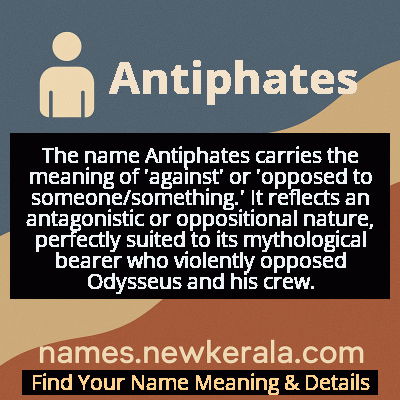Antiphates Name Meaning & Details
Origin, Popularity, Numerology Analysis & Name Meaning of Antiphates
Discover the origin, meaning, and cultural significance of the name ANTIPHATES. Delve into its historical roots and explore the lasting impact it has had on communities and traditions.
Name
Antiphates
Gender
Male
Origin
Greek
Lucky Number
5
Meaning of the Name - Antiphates
The name Antiphates carries the meaning of 'against' or 'opposed to someone/something.' It reflects an antagonistic or oppositional nature, perfectly suited to its mythological bearer who violently opposed Odysseus and his crew.
Antiphates - Complete Numerology Analysis
Your Numerology Number
Based on Pythagorean Numerology System
Ruling Planet
Mercury
Positive Nature
Adventurous, dynamic, curious, and social.
Negative Traits
Restless, impatient, inconsistent, prone to indulgence.
Lucky Colours
Green, white.
Lucky Days
Wednesday.
Lucky Stones
Emerald.
Harmony Numbers
1, 3, 9.
Best Suited Professions
Sales, marketing, travel, entertainment.
What People Like About You
Versatility, charisma, adventurous spirit.
Famous People Named Antiphates
Antiphates of Lemnos
Mythological King
Destroyed Odysseus' fleet in Homer's Odyssey
Antiphates the Cyclops
Mythological Being
Cannibalistic giant in Greek mythology
Antiphates of Sparta
Historical Warrior
Notable Spartan military figure
Name Variations & International Equivalents
Click on blue names to explore their detailed meanings. Gray names with will be available soon.
Cultural & Historical Significance
Extended Personality Analysis
The personality associated with Antiphates is characterized by formidable strength, territorial instinct, and an uncompromising nature. Individuals with this name are typically seen as powerful figures who command respect through presence alone, often exhibiting a natural authority that others find intimidating. They possess intense protective instincts toward their domain, family, or principles, and will defend them with relentless determination. This personality type tends to be highly suspicious of outsiders and resistant to change or external influence, preferring established traditions and familiar environments. The mythological background suggests a capacity for extreme measures when threatened, combined with primal survival instincts. However, these traits can also manifest as loyalty, resilience, and the ability to withstand tremendous pressure. The oppositional nature implied by the name's meaning often results in individuals who challenge conventions and refuse to conform to external expectations, making them either revolutionary leaders or formidable obstacles depending on circumstance.
Modern Usage & Popularity
In modern contexts, Antiphates remains virtually unused as a personal name due to its strong mythological associations with cannibalism and destruction. Its contemporary presence is limited to academic references in classical studies, occasional appearances in fantasy literature or games, and specialized artistic works drawing from Greek mythology. The name has never registered in baby name databases or popularity charts, reflecting its complete absence from modern naming practices. However, it maintains relevance in educational contexts where Homer's Odyssey is studied, and occasionally surfaces in philosophical discussions about the 'other' or cultural opposition. The name's complexity, dark connotations, and challenging pronunciation make it impractical for modern use, though it continues to serve as an important reference point in understanding Greek literary traditions and mythological archetypes.
Symbolic & Spiritual Meanings
Symbolically, Antiphates represents the concept of absolute opposition and the destructive power of encountering the unfamiliar. He embodies the archetype of the hostile territory that must be navigated or overcome in any significant journey or quest. The name symbolizes raw, untamed nature opposing civilization, the consequences of crossing forbidden boundaries, and the violent rejection of foreign influence. Metaphorically, Antiphates can represent any formidable obstacle that tests one's resilience and determination—whether personal, professional, or spiritual. He signifies the price of exploration and the dangers that accompany venturing into unknown realms. The cannibalistic aspect adds layers of symbolism about consumption, transformation, and the ultimate cost of confrontation. In psychological terms, Antiphates might represent the shadow self or the internal opposition one must face and overcome to achieve personal growth or completion of a life journey.

